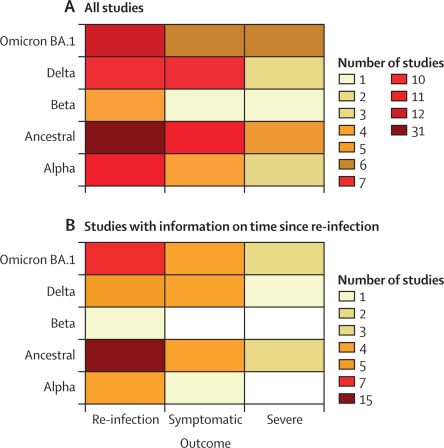Background
Understanding the level and characteristics of protection from past SARS-CoV-2 infection against subsequent re-infection, symptomatic COVID-19 disease, and severe disease is essential for predicting future potential disease burden, for designing policies that restrict travel or access to venues where there is a high risk of transmission, and for informing choices about when to receive vaccine doses. We aimed to systematically synthesise studies to estimate protection from past infection by variant, and where data allow, by time since infection.
Interpretation
Protection from past infection against re-infection from pre-omicron variants was very high and remained high even after 40 weeks. Protection was substantially lower for the omicron BA.1 variant and declined more rapidly over time than protection against previous variants. Protection from severe disease was high for all variants. The immunity conferred by past infection should be weighed alongside protection from vaccination when assessing future disease burden from COVID-19, providing guidance on when individuals should be vaccinated, and designing policies that mandate vaccination for workers or restrict access, on the basis of immune status, to settings where the risk of transmission is high, such as travel and high-occupancy indoor settings.
👀


The problems with infection are obvious, but it is absolutely worth doing analyses of the endemic situation. I haven't checked the work on this particular study, but past infection does provide high quality protection, absolutely, compared to the approved medical products which only have genetic material for the spike protein subunit S1 of whichever strain they're based on. Whether that high quality protection comes at cost, or isn't worth considering because of risk of death, isn't what this study alone can determine. Anything can of course be misinterpreted by bad faith policymakers.
For the most disruptive public health crisis in modern history, it's absurd that the data is as bad as it is. Especially the trial and pharmacovigilance data.
ironic really